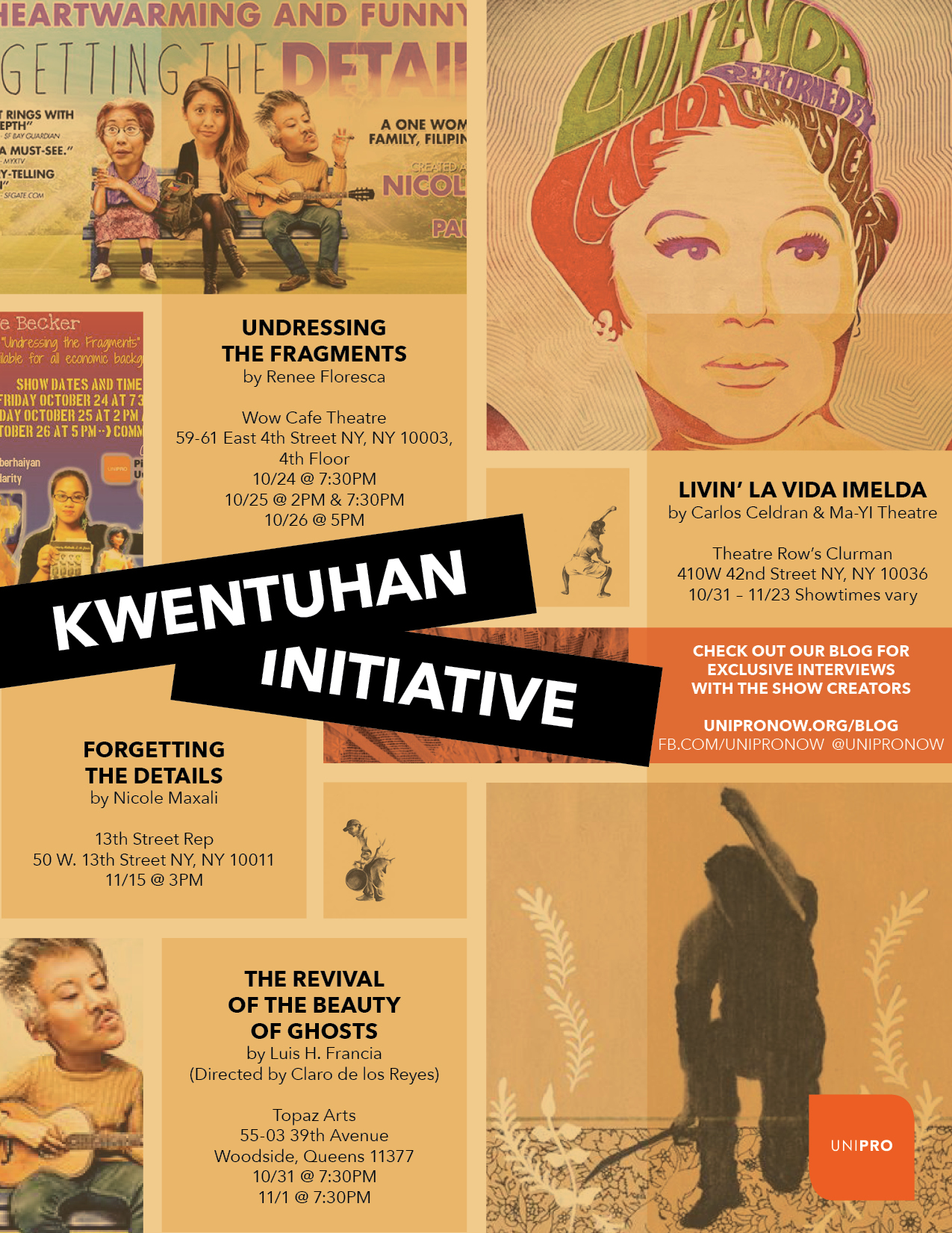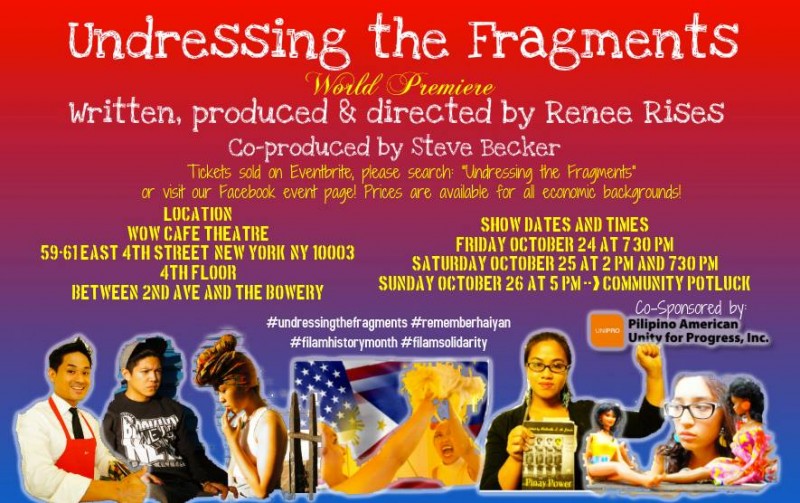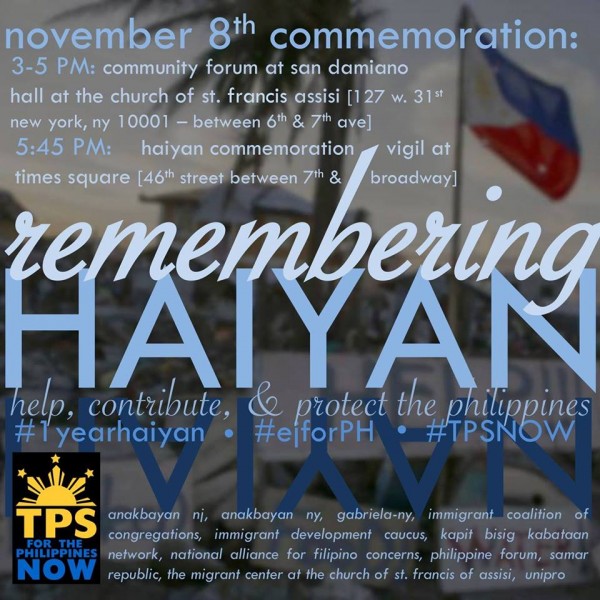“Storytelling is the most important part of any culture. It is the way we pass on our values, our dreams, our memories, our ancestry, our history, our herstory. It is a tool to keep our culture alive,” writes Renee Rises. She continues, “Every day a person tells a story. In every culture, in every country, we live our lives and we share stories daily. About our day, about our best friend, about our youth, about teaching, about creating art, about the closeness of our family, our struggles, our foods, our literature.... Stories live everywhere.”
It is precisely because of this - the undeniable power of storytelling - that UniPro launched the Kwentuhan initiative. Celebrating Filipino American History Month and the unique stories of our community, Kwentuhan promotes four different theatrical productions, all the original work of Filipinos in NYC, all showing through October and November 2014. The first of these shows is Renee’s Undressing the Fragments.
On Friday, October 24 at the WOW Cafe Theater in NYC, I attended the premiere of Undressing the Fragments, a non-linear theatrical production that delves into the lives of 14 characters in one act and 16 scenes. Although they are all Filipino American, Renee captures the diversity within our community by portraying the characters as very unique individuals; they experience different hardships and joys, they relate to their ancestral heritage in their own ways (if at all), and they have varying (and sometimes conflicting) values. On top of the struggles of trying to build lives of happiness and success, as members of the Invisible Minority navigating between (at least) two worlds, the characters must face the reality and helplessness of being oceans away from their motherland as it is ravaged by Super Typhoon Haiyan. Renee explains:
"Undressing the Fragments is a play that explores the diversity of the Filipina/o American community during the time of a natural disaster, during Typhoon Haiyan. It brings about various issues that impacted the community before, during and after the storm. While the play takes place during the most catastrophic typhoon to ever hit the Philippines, it explores issues that Filipina/os in America face as families, friends, educators, activists, soldiers, mothers, wives, brothers, sisters and humans. There isn't one issue it focuses on, it's many; hence-- fragments. There are so many pieces to our identity and I wanted to capture as many voices and lives as I possibly could in a small amount of time. I wrote the play while travelling in California from San Francisco, to LA, to San Diego, to Chicago and back to New York. I listened to many Filipina/os across the country and I listened deeply. I wrote with all of their stories in mind."
The play succeeds not only in engaging the audience in the characters' complex emotions, but also in challenging us with thoughtful, uncomfortable, and at times unanswerable questions. "What does it mean to be a Filipina/o in America?" states the show description. In this play, it means everything from college PCNs to playing with light-skinned dolls that contrast so starkly with your own skin color, and from superstitions to the ugliness of shame in your queer family member. This latter scene, when a young Pinoy reveals his sexual orientation to his much-respected Kuya, was an "Oh, shit" moment for me; suddenly my Filipino American-ness smacked me in the face and I found that I was fighting to keep myself together. Although it is not a scenario that I have experienced personally, the scene expressed so much about the respect, pride, and social acceptance that Filipino American families value so dearly, and which may also become a weight so heavy that it forces the family - the foundation of Filipino culture - to fall apart.
Just as meaningful as the play was the post-show talkback, when Renee and the actors conversed with the audience about what we had just seen. What surprised us? What affected us? We spoke about the significance of the spotlight highlighting the teen-aged Jessica, the youngest character in the play, who will share with other Filipino American youth the honor/burden of carrying forth and building upon our community's traditions, successes, and shortcomings. We spoke, of course, about Typhoon Haiyan, raising the same question we've all heard over and over again since last November: What can we do to help? Well, what CAN we do? We're here in the States, miles away from the land that many of us, perhaps, know very little about. Are we obligated to join relief and rebuilding efforts on the ground? Should we organize our own fundraising events? Where should we send the funds?
Of the many questions asked and thoughts shared during this discussion, Renee's poignant reflection on Haiyan resonated with me the most. She explained how the destruction of Hurricane Katrina had blown her away upon seeing it firsthand as a volunteer. To think that Haiyan's level of devastation was much worse, and that this time, she looked like the victims.... This inexplicable connection that she feels to Filipinos – kapwa – made an enormous sense of guilt and helplessness well within her for being in NY rather than in the Philippines. But as Undressing the Fragments actress Jana Lynne Umipig responded, yes, we ARE here. We must be fully present where we are, remembering the reasons why our families migrated here, and innovating ways to maximize our impact as a united community. True to life, Undressing the Fragments leaves the focus of that impact as yet to be determined.
As for the overall message Renee wants the audience to take away? “I want the audience to make decisions for themselves. The message? Filipinos are... unique. We're beautiful. We're diverse. We're complex. We struggle. We're brown. We're yellow. We're friends. We're enemies. We're artists. We're talented. We exist. We have dreams. We have hopes. Aspirations. We work together. We are solidarity. We struggle. We listen. We learn. We love. We are human.”
To read more from Renee Rises, check out her three-part story in The FilAm Magazine:
- Part 1: The first wave of Asian American actors were Filipinos
- Part 2: Here Lies Love’ provides full-time jobs to FilAm actors
- Part 3: Coming soon!
For more Kwentuhan, support our community’s artists and attend the rest of the shows, and return to our blog for exclusive interviews with the creators:
- Luis Francia’s The Beauty of Ghosts (directed by Claro de los Reyes)
- Carlos Celdran’s Livin’ La Vida Imelda (directed by Ralph B. Peña)
- Nicole Maxali’s Forgetting the Details
Lastly, to get involved in NYC community efforts to commemorate Typhoon Haiyan and discuss climate justice, attend the "Remembering Haiyan" community forum + vigil on Saturday, November 8, 2014.
Special thanks to Kirklyn Escondo for interviewing Renee!




